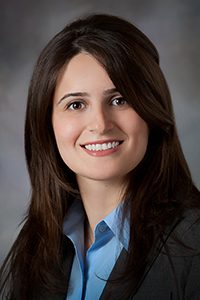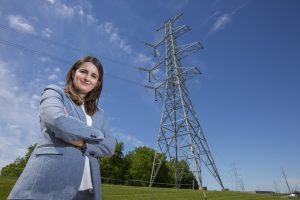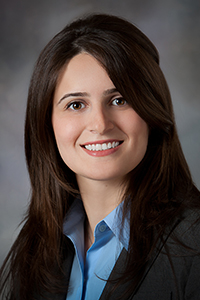
Iowa State structural engineering researcher earns prestigious Faculty Early Career Development (CAREER) funding to increase resiliency of electric power networks under windstorm and aging effects
In March, the National Science Foundation (NSF) awarded Iowa State Structural Engineering Assistant Professor Alice Alipour a Faculty Early Career Development (CAREER) Award.
Alipour is the principal investigator of the project, “Resiliency of Electric Power Networks under Wind Loads and Aging Effects through Risk-Informed Design and Assessment Strategies.” She is one of seven CAREER Award recipients across ISU’s College of Engineering .
During this five-year, $500,000 project, Alipour and her team will be taking both a component and system-level approach toward assessment and design of transmission line systems. Their goal is to create more resilient electric power networks (or EPNs) that can hold up under extreme weather conditions and aging effects.
“Electric power is essential for everyday life and the economy,” Alipour explained. “In recent years, with extreme weather events that have happened, we have seen many outages. Some of these losses are attributed to the vulnerabilities in the physical infrastructure of the power system.”
Alipour uses various examples, such as the Northeast Blackout of 2003 or, more recently, the devastating impact of Hurricane Maria on Puerto Rico, as an example of such outages. The type of EPN that fail during large-scale blackouts carry high-voltage electric currents and power the needs of metropolitan areas or industry. When the transmission of power fails (as in Alipour’s examples), daily life can come to a grinding halt.

This research is unique in its system-level approach, says Alipour. She wants to look not just at individual transmission towers, which is a conventional approach to improving EPNs. Instead, a central theme of this research project is to combine a structural engineering perspective with a system engineering perspective to create an entire system that is more resilient.
“You analyze a system or a known collection of structures together, and you estimate what is the effect of the failure of each one of them in the communities that they serve …,” Alipour said. “Looking into these consequences, you can measure which structures are more critical to your system. Then you will have a justification to design them to higher standards, rather than what is required by [national or local electric] codes.”
There are multiple outcomes of this CAREER Award:
1. Impact on natural hazard engineering research community’s perspective toward more resilient infrastructure
2. Transforming the fields of structural engineering, wind engineering, stochastic mechanics, and system engineering, especially in regard to EPN
3. Design recommendations that capture the system-level thinking to the transmission tower design community
4. Integrated research, education, outreach and training
“With these design approaches or new design plans, you will end up with a more resilient power system and a more resilient community that is served by that power infrastructure,” Alipour summarized. “So the social benefits in the long run are going to be immense.”
As stated by the NSF, “The Faculty Early Career Development (CAREER) Program is a Foundation-wide activity that offers the National Science Foundation’s most prestigious awards in support of early-career faculty who have the potential to serve as academic role models in research and education and to lead advances in the mission of their department or organization. Activities pursued by early-career faculty should build a firm foundation for a lifetime of leadership in integrating education and research.”
Read up on the most recent research at Iowa State’s Department of Civil, Construction and Environmental Engineering by following us on Facebook, Twitter and LinkedIn (Iowa State University Civil, Construction and Environmental Engineering and ISUConE).
